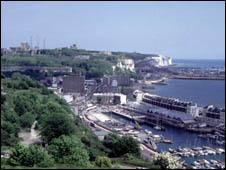Dover port privatisation talks 'a waste of time'
- Published

The Port of Dover is the largest passenger port in northern Europe
Three ferry companies have described their consultations with Dover Harbour Board over plans for privatisation as "a meaningless waste of time".
SeaFrance, P&O and Norfolkline claim £60m they provided to fund a second terminal at the port of Dover will have been wasted if the sell-off goes ahead.
P&O said it was now lodging a formal complaint with the Department for Transport against the harbour board.
The board said talks with the ferries over its sell-off plans were ongoing.
The Port of Dover has been a trust port for 400 years, with all revenues going back into it.
'Community trust'
Earlier this year the board applied to the secretary of state for transport for the authority to introduce private capital.
Chris Laming, from P&O Ferries, said its talks with the Dover Harbour Board over the future of the port had "led to nothing".
He added: "We've now filed a complaint to the secretary of state because we're so concerned about the prices we could be charged in the future under the Dover scheme, which is really the privatisation of a monopoly, and it could threaten the whole of the ferry industry in Dover."
A spokesman for the Port of Dover said it was unaware of the statement by the ferry operators, and was "continuing discussions with them in order to reach a positive outcome".
The Conservative MP for Dover, Charlie Elphicke, said as an alternative to the privatisation plans the port could be owned by a community trust, made up of local representatives which would lease the port to an operator.
He said the port could be sold off through a bond scheme, which would still raise vital revenue for the government.